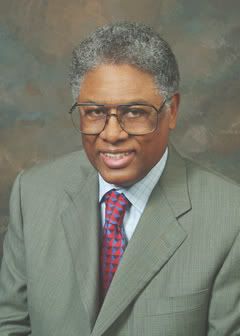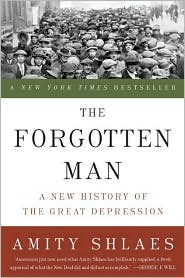
Posted on 06/17/2010 11:51:12 AM PDT by jazusamo
Sometimes you can read a book that will change your mind on some fundamental issue. Rarely, however, is there just one page that can undermine or destroy a widely-held belief. But there is such a page-- page 77 of the book "Out of Work" by Richard Vedder and Lowell Gallaway.
The widespread belief is that government intervention is the key to getting the country out of a serious economic downturn. The example often cited is President Franklin D. Roosevelt's intervention, after the stock market crash of 1929 was followed by the Great Depression of the 1930s, with its massive and long-lasting unemployment.
This is more than just a question about history. Right here and right now there is a widespread belief that the unregulated market is what got us into our present economic predicament, and that the government must "do something" to get the economy moving again. FDR's intervention in the 1930s has often been cited by those who think this way.
What is on that one page in "Out of Work" that could change people's minds? Just a simple table, giving unemployment rates for every month during the entire decade of the 1930s.
Those who think that the stock market crash in October 1929 is what caused the huge unemployment rates of the 1930s will have a hard time reconciling that belief with the data in that table.
Although the big stock market crash occurred in October 1929, unemployment never reached double digits in any of the next 12 months after that crash. Unemployment peaked at 9 percent, two months after the stock market crashed-- and then began drifting generally downward over the next six months, falling to 6.3 percent by June 1930.
This was what happened in the market, before the federal government decided to "do something."
What the government decided to do in June 1930-- against the advice of literally a thousand economists, who took out newspaper ads warning against it-- was impose higher tariffs, in order to save American jobs by reducing imported goods.
This was the first massive federal intervention to rescue the economy, under President Herbert Hoover, who took pride in being the first President of the United States to intervene to try to get the economy out of an economic downturn.
Within six months after this government intervention, unemployment shot up into double digits-- and stayed in double digits in every month throughout the entire remainder of the decade of the 1930s, as the Roosevelt administration expanded federal intervention far beyond what Hoover had started.
If more government regulation of business is the magic answer that so many seem to think it is, the whole history of the 1930s would have been different. An economic study in 2004 concluded that New Deal policies prolonged the Great Depression. But the same story can be found on one page in "Out of Work."
While the market produced a peak unemployment rate of 9 percent-- briefly-- after the stock market crash of 1929, unemployment shot up after massive federal interventions in the economy. It rose above 20 percent in 1932 and stayed above 20 percent for 23 consecutive months, beginning in the Hoover administration and continuing during the Roosevelt administration.
As Casey Stengel used to say, "You could look it up." It is all there on that one page.
Those who are convinced that the government has to "do something" when the economy has a problem almost never bother to find out what actually happens when the government intervenes.
The very fact that we still remember the stock market crash of 1929 is remarkable, since there was a similar stock market crash in 1987 that most people have long since forgotten.
What was the difference between these two stock market crashes? The 1929 stock market crash was followed by the most catastrophic depression in American history, with as many as one-fourth of all American workers being unemployed. The 1987 stock market crash was followed by two decades of economic growth with low unemployment.
But that was only one difference. The other big difference was that the Reagan administration did not intervene in the economy after the 1987 stock market crash-- despite many outcries in the media that the government should "do something."

Is there some way we can do a body snatch? Thomas Sowell into the WH and the kenyan into a mud hut next to his brother where he can’t do any more damage.
What was the difference between these two stock market crashes? The 1929 stock market crash was followed by the most catastrophic depression in American history, with as many as one-fourth of all American workers being unemployed. The 1987 stock market crash was followed by two decades of economic growth with low unemployment.
But that was only one difference. The other big difference was that the Reagan administration did not intervene in the economy after the 1987 stock market crash-- despite many outcries in the media that the government should "do something."
As usual, Sowell blows my mind with some insight that he articulates in a powerful way.
This is the type of information we have to teach our children! We are dying as a nation for "lack of knowledge." And, yes, I mean that on several relevant scales.

My reply was that number was not that high and 6% had been considered "full employment" at different times in US history.
But she bought the MSM line about how catastrophic that number was. Well, haven't heard anything from her lately about how catastrophic the 50% higher 9.9% unemployment is under Bambi.
This article takes too long to state the obvious.
When government ‘does something’ it changes the rules.
It then takes time to re figure out how to play the game.
Running a business is like playing poker. You have to know the odds and all of the players.
When government ‘does something’ they change the odds and change the players. They also change how much the house rakes out of the pot.
All of this takes time and some players simply walk away.
see
http://ingrimayne.com/econ/EconomicCatastrophe/GreatDepression.html
About half way down the page unemployment rate graph
Yes, this is a classic Sowell piece and not the first time he’s articulated it. Though he didn’t mention Obama it’s pretty clear his timing for it.
Dr. Powell knocks another one out of the park. Truth is the enemy of the left.
Ever tried showing proof to a Liberal? They instantly dismiss it and you. It’s the IDEA, you see, that’s important, not the facts.
That graph does not match it’s description in the OP article. It just shows a basically straight line going up in the time period discussed.
It’s not unusual that libs believe what they want to believe about an administration they detest and ignore hard reality about one they worship. I doubt you’ll hear a word from her now. :)
Marking
The government doesn’t just change the rake. It reaches into the winners’ chip stacks, keeps a bunch for itself, and tosses the remainder in the air. The short stacks like this game. The competent players leave with the chips they still have.
But it’s really different from poker because the competent players have the ability to create valuable new chips out of talent and hard work. While to competent players are in the game, the number of chips on the table grows. When they leave, the game stagnates.
Thanks, that sure bears out Dr. Sowell’s piece.
New tagline...
bfl
I explained it to a friend that ‘the market’ hates government intervention because it is unpredictable.
It is as if you were going to bet on horse races, and you researched the heck out of what horses were fast, what jockeys were good, etc; and then some official decides that, no matter which horse actually crossed the line first, THEY would decide who the winners and losers were.
Suddenly you wouldn't want to ‘bet’ your money anymore, would you?
Very good and so true.
Disclaimer: Opinions posted on Free Republic are those of the individual posters and do not necessarily represent the opinion of Free Republic or its management. All materials posted herein are protected by copyright law and the exemption for fair use of copyrighted works.